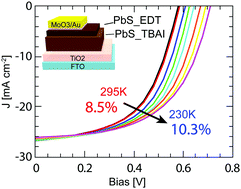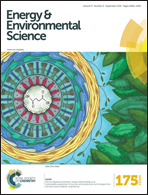Temperature dependent behaviour of lead sulfide quantum dot solar cells and films†
Abstract
Despite increasing greatly in power conversion efficiency in recent times, lead sulfide quantum dot (PbS QD) solar cells still suffer from a low open circuit voltage (VOC) and fill factor (FF). In this work, we explore the temperature dependent behavior of ∼9% efficient solar cells. In the temperature range of 290 to 230 K, we find increased VOC and FF values without significant degradation of the short circuit current, leading to up to 10.3% efficiency at 230 K. The change in VOC is driven by the decrease of the reverse saturation current which fits the PN-junction model. Using Schottky and single carrier devices, we measure the carrier mobility, diffusion lengths, and doping concentrations of PbS QD films with tetrabutylammonium iodide and ethane dithiol ligands as a function of temperature. Both mobility and diffusion length are found to decrease with decreasing temperature while device performance increases, indicating that the 260 nm thick active layer is fully depleted. Finally, we propose that further optimization of the doping concentrations could help achieve increased device performance at room temperature.



 Please wait while we load your content...
Please wait while we load your content...